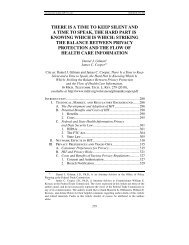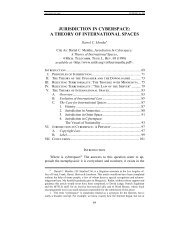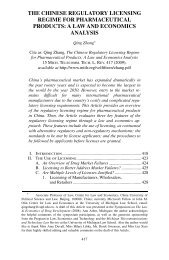Fracking Patents - Michigan Telecommunications and Technology ...
Fracking Patents - Michigan Telecommunications and Technology ...
Fracking Patents - Michigan Telecommunications and Technology ...
- No tags were found...
You also want an ePaper? Increase the reach of your titles
YUMPU automatically turns print PDFs into web optimized ePapers that Google loves.
Spring 2013] <strong>Fracking</strong> <strong>Patents</strong> 327Potential defendants should be aware of these limitations before capitulatingto cease <strong>and</strong> desist dem<strong>and</strong>s.Until recently, a patent owner who established infringement could expectto obtain an injunction relatively automatically. That changed as a resultof the Supreme Court’s decision in eBay v. MercExchange. 320 In that caseinvolving a patent holding company’s assertion that eBay, an Internet auctionservice, should be enjoined from infringement, the Court emphasizedthe fact that injunctions are equitable remedies that can be applied onlywhen necessary to prevent irreparable harm <strong>and</strong> when legal remedies aredeemed inadequate. 321 That st<strong>and</strong>ard may be difficult to surmount when thealleged harm relates primarily to information disclosure. In the abstract,most parties making use of fracturing patents will not compete with the patentowners or damage the market for the products. A court would be verylikely to conclude that a royalty is the preferred remedy.Of course, a royalty fee can still be a significant disincentive to use. Thisis particularly the case when one factors in litigation costs. In these times oftight budgets, a university or public interest group may be disinclined to takethe risk of infringing a patent, <strong>and</strong> may be unable to prospectively enter intoa license. Absent additional limiting factors, a remedy at law can be a significantdeterrent that will constrain the information environment.D. Sovereign Immunity Opens Even Broader University PowersThe fact that damages will be the most likely result of litigation leads toone more important limitation on patent rights that could act as a savinggrace: sovereign immunity. This is a broad doctrine recognizing that governmentsare generally immune from lawsuits unless they waive immunity <strong>and</strong>agree to the jurisdiction of a court. 322 In the context of patents, state immunityfrom suit in federal court is the most important application of this doctrine.323 By statute, litigation arising under the Patent Act must take place infederal court. 324 States are immune from such actions as a result of the EleventhAmendment to the U.S. Constitution. The Eleventh Amendment, whichwas adopted to overrule a 1793 Supreme Court decision declaring that states320. eBay Inc. v. MercExchange, L.L.C., 126 S. Ct. 1837 (2006).321. Id. at 391–92.322. See Katherine Florey, Sovereign Immunity’s Penumbras: Common Law, “Accident,”<strong>and</strong> Policy in the Development of the Sovereign Immunity Doctrine, 43 WAKE FORESTL. REV. 765, 771–82 (2008) (providing an overview of the development of state, federal tribal<strong>and</strong> foreign sovereign immunity doctrine in the United States).323. Although the federal government has the right to invoke immunity from patent lawsuitsas well, this immunity is specifically waived by 28 U.S.C. § 1498 (2011).324. 28 U.S.C. § 1338 (2011); Gunn v. Minton, 133 S.Ct. 1059, 1064 (2013).






